Russian passport
| International Russian passport | |
|---|---|
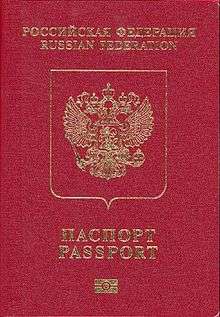 The front cover of a contemporary Russian biometric passport. | |
| Date first issued | 1 March 2010 |
| Issued by | Russian Federation |
| Type of document | Passport |
| Purpose | Identification of Russian citizens |
| Eligibility requirements | Russian Federation citizenship |
| Expiration | 10 years (biometric), 5 years (non-biometric) |
| Cost | 3500 rubles for biometric passport, 2000 rubles for non biometric |
The Russian passport is a legal document issued to the citizens of the Russian Federation for the purposes of travelling abroad.
The Russian Federation currently issues two types of passports: non-biometric and biometric. Non-biometric passports are currently valid for 5 years, biometric passports issued after 1 March 2010 are valid for 10 years and have an increased number of pages from 36 to 46.
Due to the exclave position of Kaliningrad Oblast, which makes a passport an essential document at any age, citizens residing there are exempt from any fees for passport issue.[1]
The right of Russian citizen to leave the country can be temporarily restricted if (s)he:[2]
- had signed a contract with the government allowing access to state secrets with provision restricting his/her right to leave the country, until the restriction is lifted as specified in the contract;
- has been conscripted to the military or alternative civil service, until the completion of service;
- is a defendant under criminal prosecution, until the verdict is reached;
- is convicted of a crime, until completion of serving time or acquittal;
- is avoiding obligations imposed by the court, until fulfilling the obligations or achieving consent between the parties;
- provided false information in his/her application, until the situation is deemed resolved by the processing agency;
- is employed by the Federal Security Service, until the expiration of contract;
- has been declared bankrupt, until the settlement is reached by the court of arbitration.
Individuals under 18 travelling without both parents must have written consent of both parents allowing their departure from country. When a child travels with one parent, consent of another parent is not required. Articles 20 and 21 of the Federal Law "On the entry in the Russian Federation and departure from the Russian Federation" govern only departure from Russia and have nothing to do with the requirements of other countries regarding entry to these countries.
In addition to regular passport there are three special-purpose types of passports for travelling abroad: diplomatic passport, service passport (issued to government employees going abroad on official business) and seaman's passport.
History
Russian Empire
Arrival of foreigners to Russia met with various restrictions in the Tsarist period; border magistrates could pass foreigners within the state only with the permission of senior government. In troubled times, it begins to produce and to travel within the country system "roadways" letters (Russian: проезжих) in order, mainly police. As a general rule letters carriageways were built by Peter I (decree of October 30, 1719), in connection with the entered his conscription and head tax. In 1724, to prevent the possibility to evade the payment of the poll tax, special rules about absences of peasants.
Under the legislation in force for the period of 1906 in Russia in the place of residence, as a general rule, the passport is not required. The exception is the capital and other cities, declared an emergency situation or enhanced protection. In addition, in areas that are subject to the rules on the supervision of industrial establishments, the workers of factories and plants are required to have a passport, and in the place of permanent residence. You do not need a passport when absence from the place of permanent residence: 1) within the district and outside it as recently as 50 vents and no more than 6 months, and 2) from the persons hired for rural work, - in addition, within the townships adjacent to the county of residence, even if more than 6 months.
Law of June 10, 1902 the regulations on residence permits June 3, 1894 extended to the province of the Kingdom of Poland, with some modifications. Formed in 1902, the Committee on the needs of the agricultural industry is recognized as desirable in the types of facilitating the movement of agricultural workers, the simplification of passport regulations. A special meeting of the needs of the agricultural industry has been entrusted to the Minister of Internal Affairs of the revision of statutes on residence permits, in the sense of saving for a passport solely value of an identity document. Elaborated on these grounds in 1905, a new draft statute was a passport to postpone consideration until the convocation of the State Duma.
Russian Soviet Federative Socialist Republic
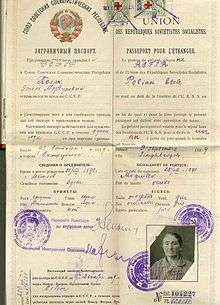
Immediately after the Russian Revolution the Russian Republic not followed the emigration; Many disagreed with the new regime left the country since 1917 to the end of the 1920s left the country about 8,000 people, including about 500 scientists (for comparison, in the period from 1989 to 2004, according to various estimates from 25,000-80,000 scientists left Russia[3]). In 1922, two flights so-called philosophical ship from Petrograd to Stettin and several ships from the territory of Ukraine and trains from Moscow on the personal instructions of Lenin were expelled 225 intellectuals (philosophers Berdyaev, Ilyin, Frank and Bulgakov). Of the emigrants only a small part returned such as Marina Tsvetaeva and Alexei Tolstoy.
By the mid-1930s the Soviet government sealed the borders. Travelling to capitalist countries was only possible to employees of the Foreign Ministry, the nomenklatura and selected artists while most ordinary Soviet citizens had the opportunity to travel only in socialist countries for trade union tour.
The third and final wave of Soviet emigration coincided with the rupture of relations with Israel. June 10, 1968 the Central Committee received a joint letter to the leadership of the Foreign Ministry and the KGB signed by Andrey Gromyko and Yuri Andropov to the proposal to allow Soviet Jews to emigrate from the country. As a result, in the 1970s the Soviet Union had left only about 4,000. People, many against their will, for example, such well-known dissidents, like Brodsky, Aksenov, Aleshkovsky, Voinovich, Dovlatov, Gorenstein, Galich.
May 20, 1991, a few months before the collapse of the USSR the last Soviet law on the exit of citizens abroad was adopted, according to which citizens could leave at the request of the state, public and religious organizations and enterprises.
The Russian Federation
In 1993, exit visas were canceled and allowed a free issue of passports, the right to freely leave the country was enshrined in the new law of 1996.[4] Passports with the symbols of the Soviet Union were issued to citizens of the Russian Federation until the end of 2000, respectively expire in the early years of the 21st century, about 10 years after the dissolution of the Soviet state. Since 2001, Russian passports were issued with the new design which includes the emblem of Russia, a double headed eagle. Since 2010, the application for registration of passport can be submitted via the website www.gosuslugi.ru.
In 2006 biometric passports were introduced in Russia. Since 2009 in all regions of Russia there are points of issue of passport and visa documents of new generation (passports containing electronic media). The data of these items come in a single personalization center data. On March 1, 2010 biometric passport are valid for 10 years. The data on the chip Russian passports are protected by a technology access control BAC (Basic access control), which allows you to produce read data only after entering the passport number, date of birth of the holder and the expiration date of the passport (usually by means of recognition of the machine readable zone of the passport), which excludes unauthorized access to data on the chip.
Description
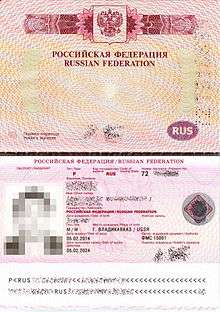
Each passport has a data page and a signature page. A data page has a visual zone and a machine-readable zone. The visual zone has a digitized photograph of the passport holder, data about the passport, and data about the passport owner:
- Photograph
- Type of document ("P" for "passport")
- Code of the issuing country (always 'RUS')
- Passport number
- Surname
- Given name(s)
- Nationality (always 'Russian Federation')
- Date of birth (DD.MM.YYYY format)
- Place of birth
- Sex
- Date of issue
- Date of expiration
- Authority
- A facsimile of the owner's signature, scanned from the application form
At the bottom of the data page is a machine-readable zone, which can be read both visually and by an optical scanner. The machine-readable zone consists of two lines. There are no blank spaces in either line. A space which does not contain a letter or a number is filled with "<".
The first line of the machine-readable zone contains a letter to denote the type of travel document ("P" for passport), the code for the citizenship of the passport holder ("RUS" for "Russian Federation"), and the name (surname first, then given names) of the passport holder.
The second line of the machine-readable zone contains the passport number (supplemented by a check digit), the code of the issuing country ("RUS" for "Russian Federation"), the date of birth of the passport holder (supplemented by a check digit), a notation of the sex/gender of the passport owner ("M" or "F"), the date of expiration of the passport (supplemented by a check digit), and, at the very end of the line, one or more overall check digits.
A signature page has a line for the signature of a passport holder. A passport is not valid unless it is signed by the passport owner (except for passport owners under age of 14).
Visa-free travel
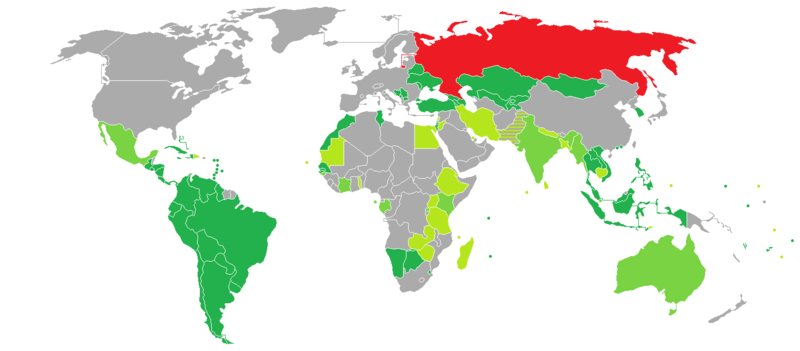
Visa requirements for Russian citizens are administrative entry restrictions by the authorities of other countries placed on citizens of Russia. In 2015, Russian citizens had visa-free or visa-on-arrival access to 102 countries and territories, ranking the Russian passport 49th in the world according to the Visa Restrictions Index.
Foreign travel statistics
According to the national statistics these are the numbers of Russian visitors arriving to various countries per annum in 2014 (unless otherwise noted):[5][6]
- 1 2 3 4 5 6 7 8 9 10 11 12 13 14 15 16 17 18 19 20 21 22 23 24 25 26 27 28 29 30 31 32 33 34 35 36 37 38 39 40 41 42 43 44 45 46 47 48 49 50 51 52 53 54 55 56 57 58 59 60 61 62 63 64 65 66 67 68 69 70 71 72 73 74 75 76 77 78 79 Data for 2015
- 1 2 3 4 5 6 Counting only guests in tourist accommodation establishments.
- 1 2 3 4 5 Data for 2013
- 1 2 3 4 Data for arrivals by air only.
- 1 2 Data for 2009
Types of passports
- Regular (red cover)
- Issuable to all citizens of the Russian Federation. Period of validity is 10 years from date of issue.
- Diplomatic (green cover)
- Issuable to Russian diplomats accredited overseas and their eligible dependents, and to citizens who reside in the Russian Federation and travel abroad for diplomatic work. Passport issued for the period of work, but no more than 10 years.
- Service (blue cover)
- Issuable to Russian federal and regional civil servants assigned overseas, their eligible dependents, to members of Russian parliament who travel abroad on official business and to judges of Supreme and Constitutional Courts. Also issued to military personnel when deployed overseas. Period of validity: length of service, but not to exceed 10 years.
- Certificate for return
- Issuable to Russian citizens and nationals overseas, in urgent circumstances. This document is valid only for return to Russian Federation.
- Depictions of the different types of Russian passports
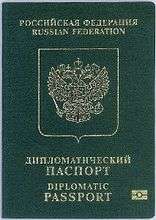 Cover of a Russian Diplomatic e-Passport
Cover of a Russian Diplomatic e-Passport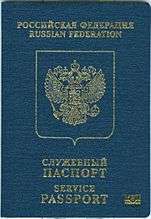 Cover of a Russian Service e-Passport
Cover of a Russian Service e-Passport
Issue Time
According to the federal law and the orders from 2012 and 2014 for the old 5-year laminated and the new 10-year biometric passport, respectively, either document has to be issued within one to four months, [111] [112] [113] depending on circumstances, with the issue time being three months in case of an application being made to a consulate outside of Russia.
However, in practice, some consulates require an appointment to be made prior to the applicant being able to provide documents to apply for the passport, in some cases, appointments can only be available many months or even possibly years into the future, effectively undoing the upper limit for a timely issuance of the travel document.
Additionally, if passports are expired or lost, applications for the new passport are routinely declined to be accepted when abroad, prior to the verification of citizenship,, for which the consuls require a separate application to be made, either in person or notarised by a notary public, with the processing times for verification itself often exceeding many months. Such practice of causing the extra costs for the applicant, however, seems to be in violation of point 23 of orders 10303 from 2012-06-28 and 3744 from 2014-03-19, which guarantee that no extra services are required in order to apply for a passport.[114]
See also
- Soviet Union passport
- Visa requirements for Russian citizens
- Identity card of the Russian Armed Forces
- Internal passport of Russia
- Universal electronic card
- Visa policy of Russia
- Passport system in the Soviet Union
- Migration card
- Propiska in the Soviet Union
- Wolf ticket (Russia)
- 101st kilometre
- Closed cities
References
- ↑ http://kaliningrad.mid.ru/oformlenie-zagranpasporta
- ↑ "Article 15 of the Federal Law - Федеральный закон от 15.08.1996 N 114-ФЗ (ред. от 13.07.2015) "О порядке выезда из Российской Федерации и въезда в Российскую Федерацию" (с изм. и доп., вступ. в силу с 01.10.2015)".
- ↑ Министерство образования обеспокоено «утечкой мозгов» из России
- ↑ Ограниченные родиной. // The New Times, 11.10.2010
- ↑ The official Russian statistics.
- ↑ Federal State Statistics 2015, page 127
- ↑ Statistical Yearbook 2014 pages 91-92
- ↑ The data obtained on request. Ministerio de turismo
- ↑ The data obtained on request. Central Bureau of Statistics Aruba
- ↑ Australian tourism. Visitors statistics by country of residence 2015
- ↑ Tourismus in Österreich 2015
- ↑ Number of foreign citizens arrived to Azerbaijan by countries
- ↑ Stopovers by Country, table 28
- ↑ Tourisme selon pays de provenance 2014
- ↑
- ↑ The data obtained on request. Bermuda Tourism Authority
- ↑ The data obtained on request. Tourism Council of Bhutan
- ↑ "Arrivals of informational visitors by country of residence".
- ↑ "Agencija za statistiku BiH" (PDF). Retrieved 23 February 2016.
- ↑ Tourism Statistics Annual Report 2014
- ↑
- ↑ Arrivals of visitors from abroad to Bulgaria by months and by country of origin
- ↑ http://www.tourismcambodia.org/images/mot/statistic_reports/tourism_statistics_2015.pdf
- ↑ Number of non-resident travellers entering Canada, by country of residence
- ↑ Air Visitor Arrivals - Origin & General Evolution Analysis
- ↑ Llegadas de Turistas Extranjeros al País
- ↑ China Inbound Tourism in 2015
- ↑
- ↑ TOURIST ARRIVALS AND NIGHTS IN 2015
- ↑
- ↑ ARRIVALS OF TOURISTS BY COUNTRY OF USUAL RESIDENCE
- ↑ Table 5 Guests, overnight stays (non-residents by country, numbers, indices)
- ↑
- ↑ Estadisticas Turisticas 2015 pages 47-48
- ↑
- ↑ Federal State Statistics Service. 2015, page 127
- ↑
- ↑ "PX-Web - Select variable and values". VisitFinland. Retrieved 21 May 2016.
- ↑ 4,799,142 according to the official Russian statistics. Number of border crossings.
- ↑
- ↑ Nombre de touristas
- ↑ 2015 GEORGIAN TOURISM IN FIGURES STRUCTURE & INDUSTRY DATA
- ↑ Tourismus in Zahlen 2015, Statistisches Bundesamt
- ↑ Hellenic Statistical Authority. Non-residents arrivals from abroad 2015
- ↑ Visitors arrival statistics. Origin of air arrivals
- ↑
- ↑ 2015 Visitor Arrivals Statistics
- ↑
- ↑ Passengers through Keflavik airport by citizenship and month 2002-2015 - 2015
- ↑
- ↑ "Jumlah Kedatangan Wisatawan Mancanegara ke Indonesia Menurut Negara Tempat Tinggal 2002–2013" (in Indonesian). Statistics Indonesia (Badan Pusat Statistik). Retrieved 25 August 2015.
- ↑ VISITOR ARRIVALS(1), BY COUNTRY OF CITIZENSHIP, Central Bureau of Statistics
- ↑ IAGGIATORI STRANIERI NUMERO DI VIAGGIATORI
- ↑ Annual Travel Statistics 2015
- ↑ - 2015 Foreign Visitors & Japanese Departures, Japan National Tourism Organization
- ↑
- ↑ Tourism in Kyrgyzstan
- ↑
- ↑
- ↑ Number of guests and overnights in Lithuanian accommodation establishments. '000. All markets. 2014-2015
- ↑ Macao statistics database
- ↑ Statistical review: Transport, tourism and other services
- ↑
- ↑ http://www.tourism.gov.mv/download/december-2015-update/
- ↑ Tourism in Malta - Statistical Report (2016 Edition)
- ↑ Number of visitors by country, 2009
- ↑ Tourist arrivals by country of residence
- ↑
- ↑
- ↑ 166,289 according to the official Russian statistics.
- ↑ Table 4. Foreign tourist arrivals and overnight stays by countries, 2014
- ↑ "Statistics of Tourists to Mongolia".
- ↑ "Myanmar Tourism Statistics 2015" (PDF). Central Statistical Organization. Ministry of National Planning and Economic Development. Retrieved 5 January 2016.
- ↑
- ↑ Inbound tourism 2014
- ↑ Statistics of New Zealand. Visitor arrivals by country of residence. Russia.
- ↑
- ↑
- ↑ Number of Tourists to Oman
- ↑ Pakistan Statistical Year Book 2012 20.31
- ↑
- ↑
- ↑
- ↑ The data obtained on request. Ministerio de Comercio Exterior y Turismo
- ↑
- ↑ Tourism in 2015
- ↑ http://ria.ru/tourism/20160727/1472955592.html
- ↑
- ↑ Tourist turnover in the Republic of Serbia - December 2015
- ↑
- ↑
- ↑
- ↑ Slovenian Tourism in Numbers 2015
- ↑ page 43
- ↑
- ↑
- ↑ TOURIST ARRIVALS BY COUNTRY OF RESIDENCE 2015
- ↑ Tourist Arrivals By Country Of Residence 2015
- ↑ "Tourism Bureau, M.O.T.C. Republic of China (Taiwan) Visitor Arrivals by Residence, 2015". admin.taiwan.net.tw. Retrieved 2015-05-28.
- ↑
- ↑ Ministry of Tourism and Sports,Thailand International Tourist Arrivals to Thailand By Nationality January - December 2015
- ↑
- ↑ Border Statistics 2015
- ↑ http://www.ukrstat.gov.ua/operativ/operativ2013/tyr/tyr_e/vig2015_e.htm Foreign citizens who visited Ukraine in 2015 year, by countries]
- ↑ Federal State Statistics Service. 2015, page 127
- ↑ 2.10 Number of visits to UK: by country of residence 2011 to 2015
- ↑ 2014 Yearbook of Immigration Statistics
- ↑ The data obtained on request. The Ministry of tourism of Uruguay, the Department of statistics.
- ↑ ESTADÍSTICAS BÁSICAS DE LA ACTIVIDAD TURÍSTICA
- ↑ International visitors to Viet Nam in December and 12 months of 2015
- ↑ "О порядке выезда из Российской Федерации и въезда в Российскую Федерацию". Federal Migration Service (Russia). Retrieved 2015-04-13.
Срок оформления паспорта дипломатическим представительством или консульским учреждением Российской Федерации не должен превышать три месяца со дня подачи заявления о выдаче паспорта, за исключением случаев подачи заявления о выдаче паспорта в форме электронного документа с использованием информационно-телекоммуникационных сетей общего пользования, в том числе сети Интернет, включая единый портал государственных и муниципальных услуг.
- ↑ "ПРИКАЗ от 19 марта 2014 г. N 3744". Ministry of Foreign Affairs (Russia). Retrieved 2015-04-11.
15. Срок оформления паспорта либо уведомления об отказе со дня подачи заявления не должен превышать: - один месяц - в случае подачи заявления по месту жительства; - четыре месяца - в случае подачи заявления по месту пребывания; - три месяца - в случае подачи заявления в загранучреждение; - три месяца - в случае подачи заявления заявителем, имеющим (имевшим) допуск к сведениям особой важности или совершенно секретным сведениям, отнесенным к государственной тайне в соответствии с Законом Российской Федерации от 21 июля 1993 г. N 5485-1 "О государственной тайне" <1> (далее - Закон Российской Федерации о государственной тайне).
line feed character in|quote=at position 101 (help) - ↑ "ПРИКАЗ от 28 июня 2012 г. N 10303". Ministry of Foreign Affairs (Russia). Retrieved 2015-04-11.
15. В соответствии требованиями статьи 10 Федерального закона паспорт выдается сроком на 5 лет. Срок оформления паспорта либо уведомления об отказе со дня подачи заявления не должен превышать: - один месяц - в случае подачи заявления по месту жительства; - четыре месяца - в случае подачи заявления по месту пребывания; - три месяца - в случае подачи заявления в загранучреждение; - три месяца - в случае подачи заявления заявителем, имеющим (имевшим) допуск к сведениям особой важности…
line feed character in|quote=at position 193 (help) - ↑ Constantine A. M. [Mcnst] (2015-04-12). "point 23 of order 3744 from 2014-03-19 seems to guarantee that service of citizenship verif cannot be pre-required www.mid.ru/bdomp/legislation.nsf/749680bd9e97b5ebc3257939004fc5f5/d60cda87f5aa1cd544257d2e0034cc40!OpenDocument" (Tweet) – via Twitter.
External links
| Wikimedia Commons has media related to Passports of Russia. |
- Statute on the Russian federation citizen's passport (in Russian).
- Federal Law On the Entry in the Russian Federation and Departure from the Russian Federation (.doc in Russian).
- Federal Law On the State Border of the Russian Federation (.doc in Russian).
- How to Apply for a Russian Passport.